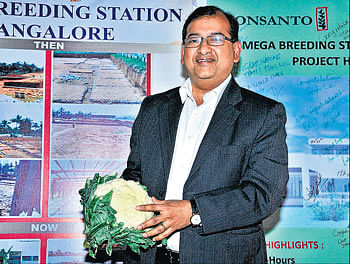The facility will develop and test new hybrid seed varieties, says MD

With a tinge of frustration and anger, Monsanto India’s Managing Director Amitabh Jaipuria clarified that the breeding station inaugurated in Chikkaballapur on Monday will not violate the Bio Diversity Act and will be a non-biotech centre.
The Rs 25 crore facility will develop and test new hybrid seed varieties of corn, tomatoes, watermelon, cabbage, cauliflower, cucumber, pepper, onions and beans. With research and development, labs, trial fields and greenhouses under one roof, the breeding station located in Kallinayakanahalli is second of its kind in India, the other being in Aurangabad.
The breeding centre is spread over 118 acres of which 100 acres was leased out from local farmers. The remaining 18 acres is owned by Monsanto.
At least 50 households in the vicinity of the station have consented to give away their agricultural fields to Monsanto for testing its hybrid seeds. The process of attaining consent has been purely through legal methods and the farmers have signed a Memorandum of Understanding with Monsanto, claimed V K Kishore, R&D Lead – Vegetables.
Benefit
“The yield will be purely the farmers’ to sell in the market. We use their land to test our products and they benefit without any cost. Monsanto also bears any other expenditure the land owner incurs during the testing period,” said Kishore. He added that farmers partnering with Monsanto in Chikkaballapur have complete freedom to grow seeds other than Monsanto’s.
During a tour around the facility, Kishore explained the importance of the Double Haploid Research Lab housed in the breeding station. “Natural process of breeding may take up to six years.
Whereas with high-end technology, this time period is reduced to a maximum of two years, after which varieties can be tested in fields,” he said.
The Mega Breeding Station will soon have polyhouses with climate control and pathology labs for developing disease resistant crops. Around 25 scientists will be working here full time, apart from 150 labourers. The produce of crop varieties from Karnataka’s breeding station will be sold across markets and states in India, while tomato seeds will be concentrated in southern states.
A mega breeding station on similar lines is expected to come up in two years in north India (near Punjab), announced Amitabh.